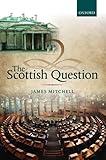The Scottish question / James Mitchell.
Publisher: Oxford : Oxford University Press, 2014Edition: First editionDescription: 308 pages ; 24 cmContent type:- text
- unmediated
- volume
- 9780199688654
- 0199688656
- 320.1509 MIT 23
- JN1228 .M58 2014
| Item type | Current library | Call number | Materials specified | Status | Barcode | |
|---|---|---|---|---|---|---|
 BOOKs
BOOKs
|
National Law School | 320.1509 MIT (Browse shelf(Opens below)) | HB | Available | 37032 |
Includes bibliographical references (pages 287-297) and index.
1. Introduction - the Scottish Question
2. Groundings
3. From night watchman to interventionist state
4. Consolidating Scottish Governance
5. Pioneers
6. The right to be taken seriously
7. Era of Planning Social Conservatism
8. Debating Devolution
9. Bringing harmony and hope
10. Here's to the next time
11. Devolution in action
12. Conclusion
Over half a century ago, a leading commentator suggested that Scotland was very unusual in being a country which was, in some sense at least, a nation but in no sense a state. He asked whether something 'so anomalous' could continue to exist in the modern world. This book considers how Scotland has retained its sense of self, and how the country has changed against a backdrop of fundamental changes in society, economy, and the role of the state over the course of the union. The Scottish Question has been a shifting mix of linked issues and concerns including national identity; Scotland's constitutional status and structures of government; Scotland's distinctive party politics; and everyday public policy. In this volume, James Mitchell explores how these issues have interacted against a backdrop of these changes. He concludes that while the independence referendum may prove an important event, there can be no definitive answer to the Scottish Question. This book offers a fresh interpretation of what has made Scotland distinctive and how this changed over time, drawing on an array of primary and secondary sources. It challenges a number of myths, including how radical Scottish politics has been, and suggests that an oppositional political culture was one of the most distinguishing features of Scottish politics in the twentieth century. A Scottish lobby, consisting of public and private bodies, became adept in making the case for more resources from the Treasury without facing up to some of Scotland's most deep-rooted problems.
There are no comments on this title.
